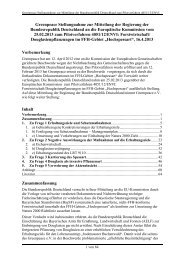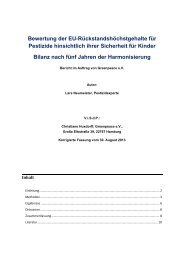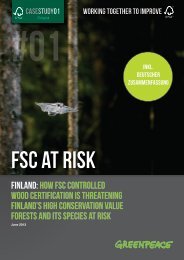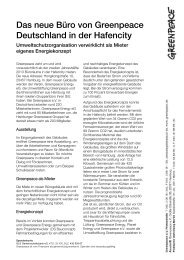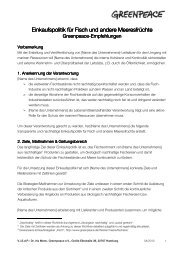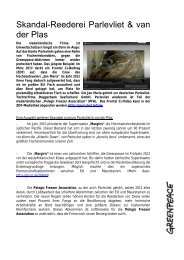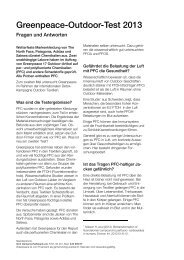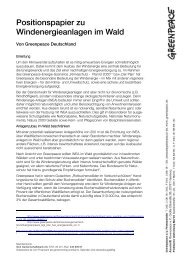Untitled - Greenpeace
Untitled - Greenpeace
Untitled - Greenpeace
You also want an ePaper? Increase the reach of your titles
YUMPU automatically turns print PDFs into web optimized ePapers that Google loves.
‘The participatory<br />
management approach that<br />
is fashionable in some donor<br />
and NGO circles has little<br />
currency in the ruthless world<br />
of industrial logging.<br />
Moreover, the fiscal revenues<br />
that should accrue to them<br />
remain more imaginary then<br />
real. These populations have<br />
no reliable mediators &<br />
insufficient experience in<br />
participatory strategies.’ 277<br />
Theodore Trefon, 2006<br />
charges makes up for the State’s inability to<br />
provide such services in remote areas.’ 278<br />
Companies often fail to meet their<br />
commitments in the social responsibility<br />
contracts. Infrastructure such as roads and<br />
houses built for their own use is allowed to fall<br />
into disrepair as soon as they have logged out<br />
a particular area, so that the forest-dwellers<br />
receive little or no lasting material<br />
compensation for the plunder of their<br />
traditional territory.<br />
Moreover, recent research conducted on<br />
behalf of the Bank 279 has highlighted the<br />
inequitable nature both of the agreements and<br />
of the process of negotiation by which they<br />
are reached (see for example the Sodefor case<br />
study on pp54–56 below). State authorities<br />
often act on behalf of the logging companies<br />
in the consultation process to ensure the<br />
agreements are signed or to stifle protest. 280<br />
Certainly, the social responsibility contract<br />
cannot be described as delivering genuine<br />
poverty alleviation or even adequate service<br />
provision, although, as the World Bank-led<br />
forestry sector review acknowledges, it is<br />
often the only benefit that forest communities<br />
receive from industrial logging.<br />
Nevertheless, although the Bank regards the<br />
redistribution of the forest area tax to<br />
provinces and territories as the chief means of<br />
driving the DRC’s development, the Forestry<br />
Code, 281 drawn up according to the Bank’s<br />
recommendations, formalises the practice of<br />
negotiating social responsibility contracts<br />
(Article 89).<br />
Until now there has been no standard<br />
procedure or template for the negotiation of<br />
social responsibility contracts, a deficiency that<br />
the Forestry Code sets out to remedy. New<br />
social responsibility contracts will need to be<br />
negotiated for logging titles that pass the legal<br />
review. 282 However, it is hard to see how<br />
standardising this procedure through the<br />
Forestry Code will overcome the intrinsic faults<br />
of the process. Negotiations between<br />
landowners and a logging company can deeply<br />
divide communities, with landowners<br />
sometimes granting access to the forest in<br />
return for little beyond purely personal gifts for<br />
CARVING UP THE CONGO 49<br />
themselves, rather than negotiating<br />
investments that benefit the entire community<br />
(see Trans-M case study on pages 50–53); or<br />
signing away the villagers’ right to protest when<br />
companies damage crops or fail to abide by<br />
their agreements. In many villages, most people<br />
are not even aware of the agreements that<br />
have been made between the loggers and the<br />
traditional landowners. Similarly, when both<br />
Bantu and pygmy communities claim rights<br />
over the same forest area (see ITB Lake Tumba<br />
case study on pages 44–46), the huntergatherer<br />
pygmies, who are most dependent<br />
upon the forest, may be sidelined.<br />
Even when a social responsibility contract is<br />
negotiated on behalf of the full community,<br />
the negotiations never happen on an equal<br />
basis (‘pas libre, pas transparent, pas<br />
équitable’ 283 ): the local traditional landowners<br />
and the wider community lack any ownership<br />
of the process, since they are unfamiliar with<br />
forestry law and often do not have a true<br />
sense of the economic value of their forest.<br />
Thus villagers are always in the weak position:<br />
the fact that local government civil servants<br />
and/or police are sometimes present during<br />
such negotiations (and typically take the side<br />
of the logging company) hampers a fair<br />
negotiating process (see Trans-M case study<br />
on page 48). Villagers feel powerless to defend<br />
themselves against the interests of a logging<br />
company working hand-in-glove with the<br />
state. They fear intimidation and arrest if they<br />
react (see Sodefor and Sicobois case studies<br />
on pages 50–53). Unsurprisingly, they often<br />
feel it is better to get something than nothing<br />
at all.<br />
Once social responsibility contracts are<br />
signed, the communities concerned have little<br />
or no leverage to ensure compliance, and<br />
there is currently no legal mechanism for<br />
conflict resolution. Even when contracts are<br />
respected, the paternalistic terms in which<br />
they are framed do little to empower<br />
communities or promote genuine<br />
development – as a report into Siforco’s<br />
operations observes: ‘The contribution of<br />
forestry exploitation to local development<br />
remains confined within the sterile bounds<br />
of a relation of near total dependence.’ 284



